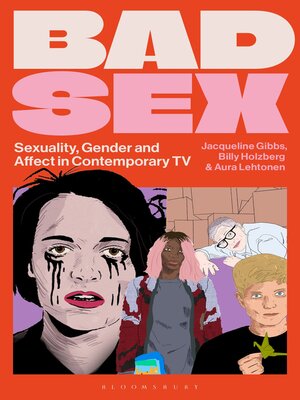Bad Sex
ebook ∣ Sexuality, Gender and Affect in Contemporary TV · Library of Gender and Popular Culture
By Billy Holzberg

Sign up to save your library
With an OverDrive account, you can save your favorite libraries for at-a-glance information about availability. Find out more about OverDrive accounts.
Find this title in Libby, the library reading app by OverDrive.



Search for a digital library with this title
Title found at these libraries:
| Library Name | Distance |
|---|---|
| Loading... |
Bad Sex traces the evolution of representations of sex on screen, from earlier portrayals of sex as glamorous or taboo, to more complex depictions of often awkward or painful experiences and feelings.
Jacqueline Gibbs, Billy Holzberg, and Aura Lehtonen examine the representation of sex and sexuality in contemporary English language drama and 'dramedy' shows like Fleabag (2016, 2019), Sex Education (2019-23), I May Destroy You (2020) and Euphoria (2019-), arguing that TV is where the politics of sexuality and gender is negotiated under the contemporary conditions of neoliberalism.
Through a cultural analysis of key television shows, they identify this shift as driven by the diversification of representations of sex and sexuality, as women, trans and non-binary, Black and minority ethnic, working-class and disabled TV professionals carve some space in a traditionally white, middle-class, cis male dominated industry. In doing so, they explore the affective potential and limits of 'bad' sex on our screens and what these representations can tell us about sexual politics and gender cultures today.
Jacqueline Gibbs, Billy Holzberg, and Aura Lehtonen examine the representation of sex and sexuality in contemporary English language drama and 'dramedy' shows like Fleabag (2016, 2019), Sex Education (2019-23), I May Destroy You (2020) and Euphoria (2019-), arguing that TV is where the politics of sexuality and gender is negotiated under the contemporary conditions of neoliberalism.
Through a cultural analysis of key television shows, they identify this shift as driven by the diversification of representations of sex and sexuality, as women, trans and non-binary, Black and minority ethnic, working-class and disabled TV professionals carve some space in a traditionally white, middle-class, cis male dominated industry. In doing so, they explore the affective potential and limits of 'bad' sex on our screens and what these representations can tell us about sexual politics and gender cultures today.







